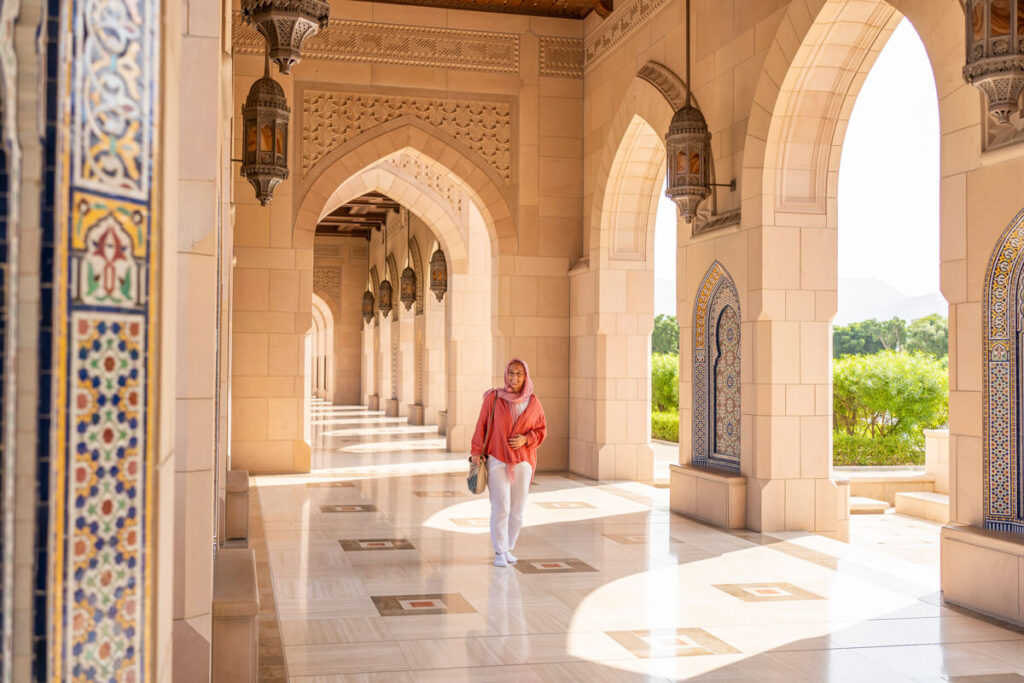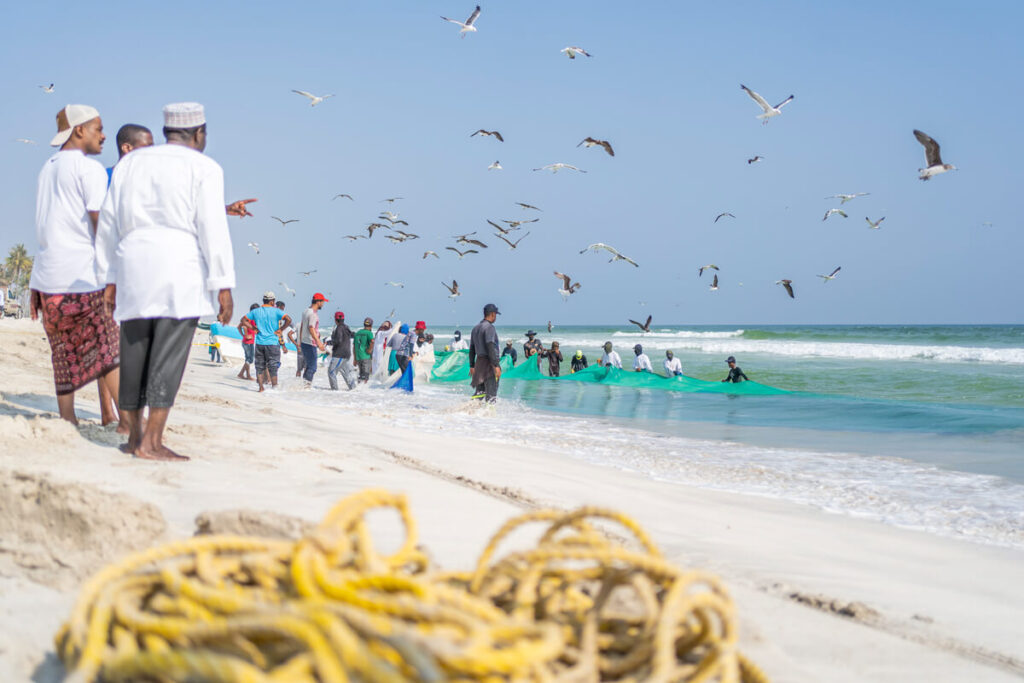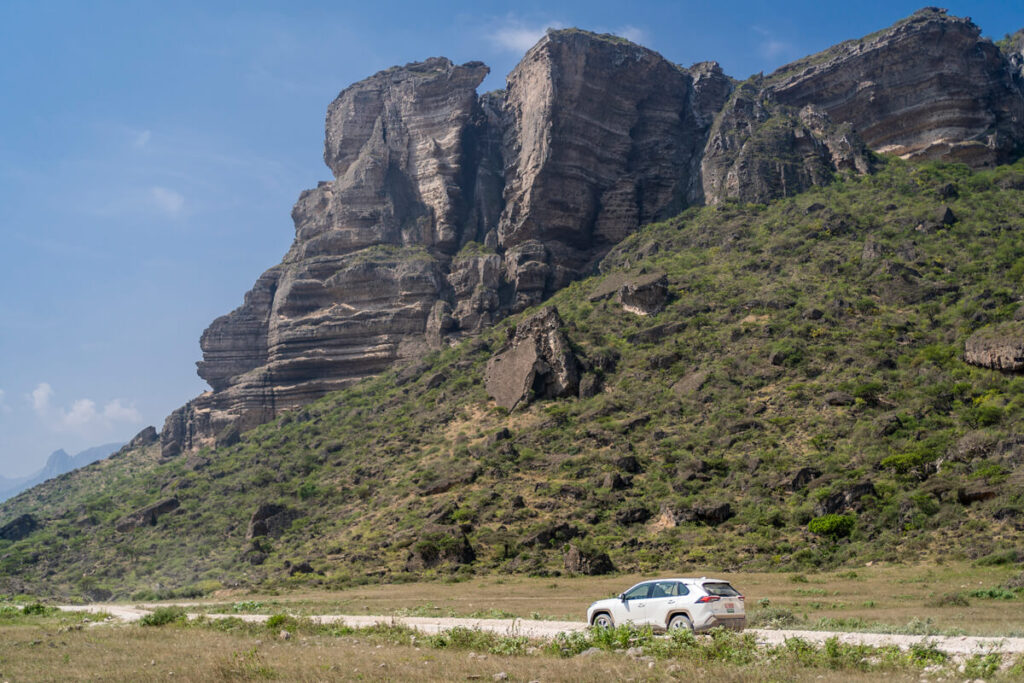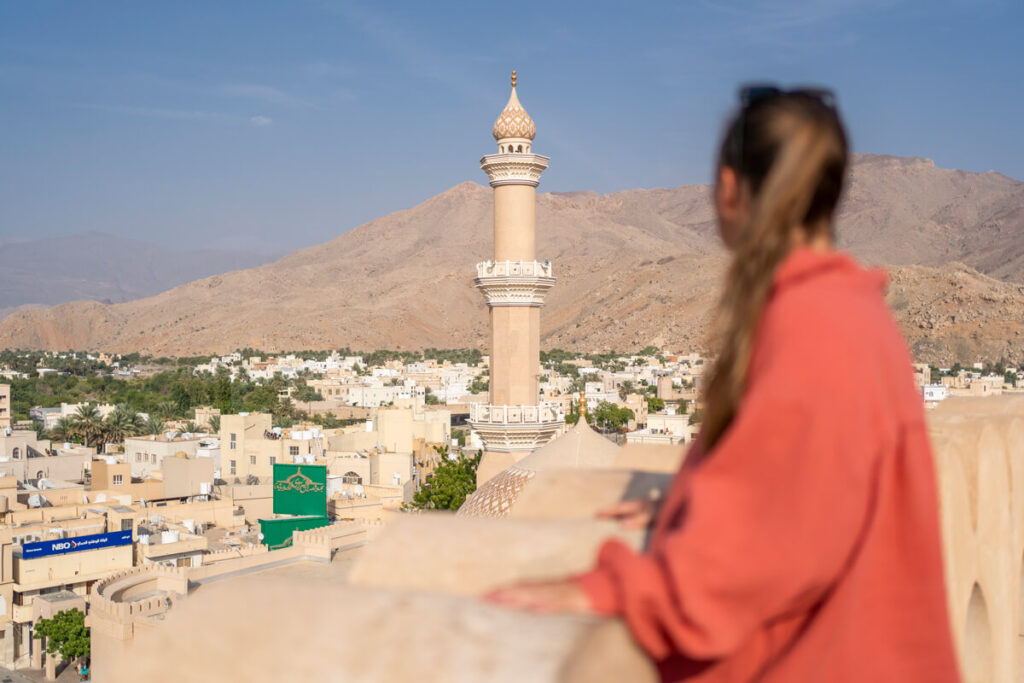During our tour through Oman, our readers and followers repeatedly asked us how safe a trip through Oman is and whether we ever felt uneasy. So much for now: Oman is one of the safest countries in the world.
Security in Oman is a top priority; the political situation is stable, and the crime rate is very low. Accordingly, we traveled through the country in a relaxed and informal manner. In the following article, you’ll learn everything about safety in Oman and what you should pay attention to during your trip. Enjoy browsing!
- Political situation in Oman
- Crime in the country
- Respect for culture
- Health aspects
- Natural hazards in Oman
- Traffic safety
- Traveling alone in Oman as a woman?
- Conclusion
Political situation in Oman
The security situation in Oman is generally considered stable and safe. The country has a low crime rate and is one of the safest countries in the world. In 2019, Oman ranked third in the world (Germany only ranked 41st). The government has a pragmatic foreign policy and maintains good relations with various countries. Political unrest is therefore generally not widespread. In addition, the government continually takes measures to ensure the safety of locals and tourists.
Oman is a monarchy and has been ruled by Sultan Qaboos bin Said al Said since 1970. Sultan Qaboos played a decisive role in modernizing the country and promoting social, economic, and political development. An important aspect of Omani policy is the policy of neutrality and balance in regional affairs. Oman has good diplomatic relations with various countries and tries to maintain a neutral position in regional conflicts. This has helped the country maintain a relatively stable political environment.
Current advice:Currently, it is advisable not to stay on the border with Yemen. There are police and military checks there. In addition, high-sea voyages off the coast are discouraged due to the risk of piracy from Yemen or Somalia. ☞ To the Federal Foreign Office.

Crime in the country
Oman generally has a low crime rate. Serious crimes are rare, and most visitors experience a truly safe stay. The government has implemented various security measures to ensure public safety. This includes regular police patrols by the Royal Omani Police, surveillance systems, and other preventative measures.
Like many other countries, Oman is also affected by cybercrime. You should therefore exercise caution when using public Wi-Fi networks and protect your personal data. Also, make sure to keep your valuables safe, especially in busy tourist hotspots. Pickpockets and petty criminals are present everywhere.
Respect the Culture
If you are planning a trip to Oman, you should respect local laws and customs. Oman is a conservative country, and therefore you should dress appropriately and be respectful of cultural norms. In the following section, we have noted a few important tips on this topic.
Clothing: Oman is a Muslim country, and you are expected to wear respectful clothing. In public areas, shoulders and knees should be covered. Women are advised to wear loose-fitting clothing that covers arms and legs. Avoid short shorts and low-cut tops at all costs.
Religious Sites: When visiting mosques or other religious sites, you should also wear appropriate clothing. Women must also cover their hair. Respectful behavior is important, and you should avoid loud conversations or obscene behavior.
Alcohol and Tobacco: The consumption of alcohol in public is prohibited except in licensed establishments such as hotels or clubs. Smoking is also prohibited on public transport, in shopping malls, and in government buildings. In general, we rarely saw people smoking in public.
Public Morals: Show affection in public in moderation, as public affection may be considered inappropriate. Also, avoid loud or rude conversations in public. Omanis don’t like that at all.
Photography: Respect people’s privacy and avoid taking photographs without their consent, especially women. Taking photographs of military installations is strictly prohibited.
Friday and Religious Holidays: Friday is the Muslim day of prayer in Oman. Many businesses and public facilities may be closed during Friday prayers. Respect this day and plan your activities accordingly.
Respect for Authority: Treat local authorities and police officers with respect. Follow the instructions of security forces and respected persons in public spaces.

Health Aspects
Healthcare in Oman is well developed, especially in urban areas. The country has made significant efforts to create an efficient healthcare system and improve medical care for its citizens and residents. Most healthcare facilities in the country are run by the government. These include hospitals, health centers, and clinics.
In addition to government facilities, there is also a growing number of private healthcare facilities in Oman. These often offer additional services and higher standards of care. Please note, however, that the country is sparsely populated, and the nearest hospital, doctor, or pharmacy can be far away. You have good cell phone reception almost throughout the country, and you can make calls in an emergency.
We recommend checking all necessary standard vaccinations before your trip and being prepared for common travel illnesses. No specific vaccinations are required for entry into Oman. However, make sure you have adequate health insurance to cover any possible medical costs. ☞ All important travel insurance. Please note that some medications are not permitted to be imported or can only be imported with a medical certificate.
Natural Hazards in Oman
Oman is quite susceptible to natural disasters such as sandstorms and occasional cyclones. We recommend that you monitor the weather conditions during your trip and take precautions if necessary.
Sandstorms: Oman is located in a desert region and is prone to sandstorms, especially during the summer months. These storms can reduce visibility and cause road traffic challenges.
Heatwaves: Oman can experience very high temperatures, especially in the summer. Heatwaves can pose health risks, so it is important to protect yourself from extreme sunlight and stay hydrated.
Cyclones: Although the country is not regularly affected by tropical cyclones, cyclones can occur between May and October. These can cause heavy rainfall and flooding, especially in coastal areas.
Earthquakes: Oman is located in a seismically active zone, and earthquakes occasionally occur (especially on the northern coast). However, most of these earthquakes are only moderately noticeable and do not cause serious damage.
Floods: Heavy rainfall, particularly during the monsoon season, can lead to flooding, especially in low-lying areas (e.g., wadis).

Traffic Safety
In general, driving in Oman is safe. The country has made significant progress in road infrastructure and road safety in recent years. However, traffic conditions can vary. Observe traffic regulations and be prepared for varying road conditions. ☞ Driving in Oman – Everything you need to know.
Driving style: Driving style in Oman can be different from that in Western countries. Drive defensively and follow local traffic laws.
Speed limits: Observe the speed limits on the roads and do not exceed them. Failure to comply will result in heavy fines and harsh penalties.
Road conditions: The main roads in Oman are very well maintained and of good quality. However, in rural areas and the desert, the roads can be unpaved, sandy, and rocky.
Sandstorms: Sandstorms can occur in desert areas, which can impair visibility. In such cases, reduce your speed and use your headlights.
Traffic Rules: Observe local traffic rules and signs. Many traffic signs are in English and Arabic, especially in cities.
Driving Under the Influence of Alcohol: Drinking and driving is strictly prohibited in Oman. The penalties are very severe.
Seat Belts: Always wear your seatbelt and make sure everyone else in the car is also wearing it.
What to Do When Encountering Camel Crossings: Camel crossings can occur in rural areas. Be extra careful and avoid frightening the animals. Drive slowly past them.
Driving License: To rent a car in Oman, you need a valid driver’s license. Always carry this with you, as police checks may occur.

Traveling alone as a woman in Oman?
Of course! You can travel the country as a woman without any concerns, whether alone or in a group. The local population shows women a great deal of respect, and unwanted advances are strongly frowned upon. Wearing a headscarf is not required except for visits to mosques.
However, we recommend wearing clothing that covers the shoulders and knees (men & women). This will not only garner more respect but also protect you from sunburn. You can also travel safely and without worry using public transport, such as buses or taxis.

Conclusion
Have all these arguments convinced you? Safety in Oman is always our top priority, and we highly recommend a trip through this fascinating country. Oman is known for its stunning hospitality and friendliness towards tourists.
As already mentioned, the crime rate is comparatively low, and the local people are generally helpful and respectful. Look forward to a very safe country with fascinating highlights and unforgettable experiences.